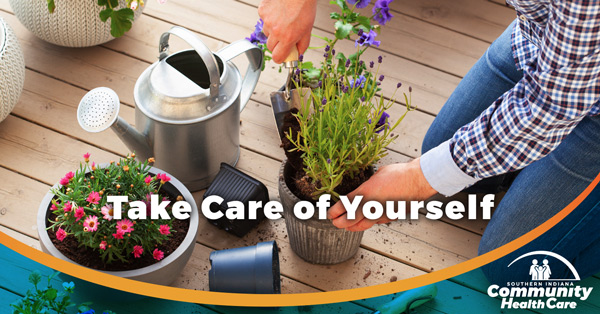Resilient Self-care: Important for Both Community and Professionals

Burnout or emotional exhaustion can cause serious issues. Whether initiated by negative personal experience or unremitting stress at work, burnout, anxiety, depression, and other issues can result when people don’t practice adequate self-care.
Already a focus in helping to address personal issues resulting from an unhealthy accumulation of Adverse Childhood Experiences (ACEs), self-care is being positively put into practice by providers and medical staff at Southern Indiana Community Health Care.
Susie Benham, office manager of the English office of Community Health Care, has been taking part in a collaborative training process to help the organization become more trauma-aware and trauma-informed, including measures to address trauma results created by sustained stress and other factors. The training and awareness, coordinated by the Indiana Department of Health, involves formal training and information sharing, which is being presented to professional staff and employees at Community Health Care offices.
Recent university research by George Mason University and other institutions shows that burnout and exhaustion rates experienced by providers and professionals in primary care are increasing at twice the level of other medical professionals. Medical professionals working many extra hours and consistently foregoing self-care in order to serve others at all times can experience challenges. Recognizing that continuous sacrifice can actually produce trauma symptoms over time is important.
“Our staff has participated in presentations that explain what being trauma-informed looks like, how it can impact people, and how staff can better practice self-care,” said Ms. Benham. “Recommended self-care measures have already been put into place and staff are responding very well.”
What does self-care look like? These include the institution of special days off where professional staff are encouraged to do things they enjoy – read a long-neglected book, work in the garden, take a short trip – instead of working 10-12 hour days. The Community Health Care staff also are also given options to reduce stress through exercise programs, expressive art therapy, financial planning, yoga classes, and supportive weight management programs.
Rested and resilient medical staff are generally more effective, and they also can pass on their personal experiences to patients, encouraging patients to avoid burnout and exhaustion by practicing self-care measures.
Southern Indiana Community Health Care has recognized how untreated and unresolved Adverse Childhood Experiences (ACEs) can directly contribute to current and later emotional and physical challenges. Research has shown how ACE scores of four or higher can directly result in later substance abuse, hypertension, and even cancer.
Community Health Care has successfully partnered with area schools and businesses to offer mindfulness and other trauma-reducing techniques for students and employees. Fore more information about this successful community initiative, read the online Limestone Post story “Public Schools in Orange County Reply on Unique Health Partnerships” here. https://limestonepostmagazine.com/rural-indiana-schools-unique-health-partnerships/
